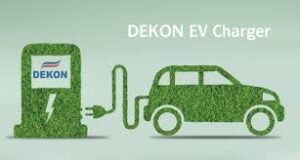UPCOMING ERA OF ELECTRIC VEHICLE
INTRODUCTION
We hear new development on regular basis of the EV sector. EV or
Electric Vehicle are the new trend, they tend to replace the ongoing
vehicles which run on crude oil like petrol and diesel. In 2008 came an
alternative of crude oil operated vehicle CNG operated vehicles but it
didn’t got that much of support from the people of India, specially for
whom this was introduced the middle class. CNG is not a complete
failure of alternative of these crude oil operated vehicles, but EV are the
best alternative one can get. A passenger vehicle emits about 4.6 metric
tone of Carbon Dioxide per year, a CNG operated vehicle emits
ammonia which significantly contributes to PM2.5 (particle smaller than
2.5 microns in size) where as EVs produce lower tailpipe emission than
the conventional vehicles. Electric vehicles are a bit expensive as
compared to conventional vehicles but they use less fuel as compared
to similar conventional vehicles as the EVs use electric drive technology
to boost the vehicles efficiency they use technologies like regenerative
braking, as the name suggest when one applies brakes on an EV the
battery of the EV starts to recharge, it converts the kinetic energy to a
form which could be stored or used immediately. Unlike CNG the EVs
are solely capable of being powered by electricity which can be
produced from various sources like, natural gas, coal, wind energy, solar
power, etc. Electric vehicles can cut the cost of fuel drastically, the fuel
economy of an EV is calculated differently as to the conventional
vehicles, miles per gallon of gasoline equivalent and kilowatt-hour per
100 miles are common metrics. The fuel consumption of the EV
depends upon the load it is carrying but if the used properly they
maintain a strong fuel-to-cost advantage. The batteries used in these
EVs are very advanced they tend to live up to 12-15 years in moderate
climate and 8-12 years in extreme climate, the manufacturers give
warranty upto 8 years on the batteries. The challenge they are facing in
India is of infrastructure many manufacturers are already in the market
but there is shortage of infrastructure like charging stations and the ones
available do take a lot of time to charge completely the charger with
50kW output takes around 2-3 hours to completely charge the vehicles,
another problem is that at some places the currently available chargers
don’t work, many states still don’t have these charging station, highways
don’t have adequate number of charging stations too which makes it
difficult to use these vehicles for interstate travel.
WHEN DID EV STARTED IN INDIA ?
In 2001 Reva from the Maini group was reviled as the India’s first
electric car. Reva soon became the country’s most affordable Electric
Vehicle and soon became world’s one of the most selling electric
vehicle, sold in 24 countries. Though first EV in India was introduced
almost 20 years ago we still see very less number of EVs on the roads
yet, now lets see why didn’t EV grew as it was supposed to be.
WHY DID EVs SAW A FAILURE ?
The EVs which run on Indian roads are divided into three category, two-
wheeler, three-wheeler and four-wheeler, they are in the following
proportion- 17%, 79% and 4% respectively, the reason for the failure of
EVs is as follows
LACK OF PRODUCT INNOVATION:– One of the main reason of
failure of Electric vehicle if lack of production innovation from the
producer’s side. The companies have failed to highlight the
practicality of Electric vehicles. Lack of charging station is also one
the reason to be listed under lack of innovation though it is not a
primary reason of failure of EV in India.
COST CONCERNS:- The customer in Indian market is very much
cost conscious, the two-wheeler and four-wheeler EVs are sold at
20% and 50% premium respectively as compared to the other
conventional vehicles. The Indian customer would choose other
conventional vehicle in comparison to the high upfront cost in
addition to this there is concern related to finance and resale value
of Electric Vehicle.
LACK OF CHARGING STATION:– As mentioned earlier lack of
charging station is a problem but not a primary one, there are about
six lakh electric vehicle on the Indian roads and rough estimate of
2000 charging station, due this distribution of charging station is a
cause of limiting the usage of EV.
Now lets look at the ADVANTAGES of Electric Vehicles
LOWER RUNNING COST:- The running cost of an Electric Vehicle is much more
cheaper than petrol or diesel run vehicle. Electric Vehicle don’t use
fossil fuel, they use source of energy like solar energy, wind energy,
etc. The charging cost of EV is much cheaper than the other
conventional vehicles.
LOW MAINTENANCE COST:– Electric Vehicles have much less
maintenance cost as compared to internal combustion vehicle, there
aren’t many moving parts as compared to ICV therefore the yearly
maintenance cost of an EV is comparatively very low.
TAX AND FINANCIAL BENEFITS:- The fees of registration and road
tax of an EV is lesser than petrol or diesel vehicles, the government
has started multiple policy to encourage buyers to buy Electric
Vehicles.
CONVENIENCE OF CHARGING AT HOME:- If you can setup an
charging slot near where you park your car at home so you could
charge the vehicle at your home as well the cost of which is very
less, so you can plug in your vehicle at night and it can get
completely charged by morning.
Now lets have a look on DISADVANTAGES of Electric Vehicles
LACK OF PUBLIC CHARGING STATION:- As said earlier there is
shortage of public charging stations there are roughly 2000 charging
station for about 6 lakh running vehicles. Though there are stations
available but still there are many charging station which are not
functional.
SLOW SPEED OF CHARGING:- The present technology of
charging vehicle is very slow the maximum capacity of charger you
can get is 50kW which charges your vehicle in about 2-3 hours
which is a lot of time.
DRIVING RANGE:– Another problem is of driving range companies
claim very high driving range of their vehicle but actually these
vehicles have about 100-125 km less range than what companies
claim.
REPLACING BATTERY IS EXPENSIVE:- The one of major problem
which I think in the EV is of changing the battery pack. A new
battery pack of the Nexon EV which is 31kWh lithium ion battery
pack would cost from 5.50 lakh to 6.20 lakh. This is a very high cost
for the Indian markets.
CONCLUSION
I would say the Electric Vehicle sector has taken a boost in last few years as we all
know Ola’s electric scooters crossed the sale of 1,100 crore in 2 days
which shows the craze of EV on the heads of the youth, I would say the
upcoming years would definitely bring development to the EV sector and
the UP COMING ERA IS REALLY OF ELECTRIC VEHICLES.


 English
English 























































































